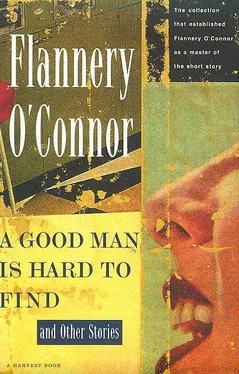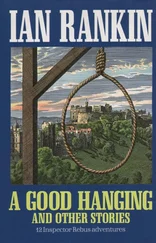“Well,” Mrs. McIntyre said to the old Negro, “we can get along without them. We’ve seen them come and seen them go—black and white.” She was standing in the calf barn while he cleaned it and she held a rake in her hand and now and then pulled a corn cob from a corner or pointed to a soggy spot that he had missed. When she discovered the Shortleys were gone, she was delighted as it meant she wouldn’t have to fire them. The people she hired always left her—because they were that kind of people. Of all the families she had had, the Shortleys were the best if she didn’t count the Displaced Person. They had been not quite trash; Mrs. Shortley was a good woman, and she would miss her but as the Judge used to say, you couldn’t have your pie and eat it too, and she was satisfied with the D. P. “We’ve seen them come and seen them go,” she repeated with satisfaction.
“And me and you,” the old man said, stooping to drag his hoe under a feed rack, “is still here.”
She caught exactly what he meant her to catch in his tone. Bars of sunlight fell from the cracked ceiling across his back and cut him in three distinct parts. She watched his long hands clenched around the hoe and his crooked old profile pushed close to them. You might have been here before I was, she said to herself, but it’s mighty likely I’ll be here when you’re gone. “I’ve spent half my life fooling with worthless people,” she said in a severe voice, “but now I’m through.”
“Black and white,” he said, “is the same.”
“I am through,” she repeated and gave her dark smock that she had thrown over her shoulders like a cape a quick snatch at the neck. She had on a broad-brimmed black straw hat that had cost her twenty dollars twenty years ago and that she used now for a sunhat. “Money is the root of all evil,” she said. “The Judge said so every day. He said he deplored money. He said the reason you niggers were so uppity was because there was so much money in circulation.”
The old Negro had known the Judge. “Judge say he long for the day when he be too poor to pay a nigger to work,” he said. “Say when that day come, the world be back on its feet.”
She leaned forward, her hands on her hips and her neck stretched and said, “Well that day has almost come around here and I’m telling each and every one of you: you better look sharp. I don’t have to put up with foolishness any more. I have somebody now who has to work!”
The old man knew when to answer and when not. At length he said, “We seen them come and we seen them go.”
“However, the Shortleys were not the worst by far,” she said. “I well remember those Garrits.”
“They was before them Collinses,” he said.
“No, before the Ringfields.”
“Sweet Lord, them Ringfields!” he murmured.
“None of that kind want to work,” she said.
“We seen them come and we seen them go,” he said as if this were a refrain. “But we ain’t never had one before,” he said, bending himself up until he faced her, “like what we got now.” He was cinnamon-colored with eyes that were so blurred with age that they seemed to be hung behind cobwebs.
She gave him an intense stare and held it until, lowering his hands on the hoe, he bent down again and dragged a pile of shavings alongside the wheelbarrow. She said stiffly, “He can wash out that barn in the time it took Mr. Shortley to make up his mind he had to do it.”
“He from Pole,” the old man muttered.
“From Poland.”
“In Pole it ain’t like it is here,” he said. “They got different ways of doing,” and he began to mumble unintelligibly.
“What are you saying?” she said. “If you have anything to say about him, say it and say it aloud.”
He was silent, bending his knees precariously and edging the rake along the underside of the trough.
“If you know anything he’s done that he shouldn’t, I expect you to report it to me,” she said.
“It warn’t like it was what he should ought or oughtn’t,” he muttered. “It was like what nobody else don’t do.”
“You don’t have anything against him,” she said shortly, “and he’s here to stay.”
“We ain’t never had one like him before is all,” he murmured and gave his polite laugh.
“Times are changing,” she said. “Do you know what’s happening to this world? It’s swelling up. It’s getting so full of people that only the smart thrifty energetic ones are going to survive,” and she tapped the words, smart, thrifty, and energetic out on the palm of her hand. Through the far end of the stall she could see down the road to where the Displaced Person was standing in the open barn door with the green hose in his hand. There was a certain stiffness about his figure that seemed to make it necessary for her to approach him slowly, even in her thoughts. She had decided this was because she couldn’t hold an easy conversation with him. Whenever she said anything to him, she found herself shouting and nodding extravagantly and she would be conscious that one of the Negroes was leaning behind the nearest shed, watching.
“No indeed!” she said, sitting down on one of the feed racks and folding her arms, “I’ve made up my mind that I’ve had enough trashy people on this place to last me a lifetime and I’m not going to spend my last years fooling with Shortleys and Ringfields and Collins when the world is full of people who have to work.”
“Howcome they so many extra?” he asked.
“People are selfish,” she said. “They have too many children. There’s no sense in it any more.”
He had picked up the wheelbarrow handles and was backing out the door and he paused, half in the sunlight and half out, and stood there chewing his gums as if he had forgotten which direction he wanted to move in.
“What you colored people don’t realize,” she said, “is that I’m the one around here who holds all the strings together. If you don’t work, I don’t make any money and I can’t pay you. You’re all dependent on me but you each and every one act like the shoe is on the other foot.”
It was not possible to tell from his face if he heard her. Finally he backed out with the wheelbarrow. “Judge say the devil he know is better than the devil he don’t,” he said in a clear mutter and turned and trundled off.
She got up and followed him, a deep vertical pit appearing suddenly in the center of her forehead, just under the red bangs. “The Judge has long since ceased to pay the bills around here,” she called in a piercing voice.
He was the only one of her Negroes who had known the Judge and he thought this gave him title. He had had a low opinion of Mr. Crooms and Mr. McIntyre, her other husbands, and in his veiled polite way, he had congratulated her after each of her divorces. When he thought it necessary, he would work under a window where he knew she was sitting and talk to himself, a careful roundabout discussion, question and answer and then refrain. Once she had got up silently and slammed the window down so hard that he had fallen backwards off his feet. Or occasionally he spoke with the peacock. The cock would follow him around the place, his steady eye on the ear of corn that stuck up from the old man’s back pocket or he would sit near him and pick himself. Once from the open kitchen door, she had heard him say to the bird, “I remember when it was twenty of you walking about this place and now it’s only you and two hens. Crooms it was twelve. McIntyre it was five. You and two hens now.”
And that time she had stepped out of the door onto the porch and said, “MISTER Crooms and MISTER McIntyre! And I don’t want to hear you call either of them anything else again. And you can understand this: when that peachicken dies there won’t be any replacements.”
Читать дальше









